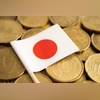Japan's core inflation in October held above the central bank's 2 per cent target and a key index stripping away the effect of fuel accelerated, data showed on Friday, keeping pressure on the central bank to raise its still-low interest rates.
The data also showed continued gains in service prices, which are closely watched by the Bank of Japan (BOJ) for clues on whether firms were passing on rising labour costs, suggesting conditions for further rate hikes were falling into place.
The readings will be among factors the BOJ will discuss at its next policy meeting on Dec. 18-19, when some analysts expect a hike in short-term rates to 0.5 per cent from 0.25 per cent as the central bank unwinds years of ultra-low rates.
The yen's renewed weakness, which heightens inflationary pressure by pushing up the cost of imports, has also led some market players to bet on a December rate hike.
"Although evidence of demand-driven price pressure remains scarce, the renewed yen depreciation over the past two months means upward pressure on prices will persist," said Stefan Angrick, senior economist at Moody's Analytics, who expects the BOJ to hike rates in December rather than wait until January.
A Reuters poll taken on Nov 13-21 showed 56 per cent of economists expect the BOJ to raise rates again in December, up from 49 per cent in last month's survey.
The nationwide core consumer price index, which includes oil products but excludes fresh food prices, rose 2.3 per cent in October from a year earlier, government data showed, slightly exceeding a median market forecast for a 2.2 per cent gain.
More From This Section
It slowed from a 2.4 per cent increase in September, mostly due to the base effect of last year's government decision to halve fuel subsidies that bumped up prices from October 2023.
A separate index that strips away the effect of volatile fresh food and fuel, scrutinised by the BOJ as a better gauge of demand-driven inflation, rose 2.3 per cent in October from a year earlier, accelerating from a 2.1 per cent gain in September.
Services inflation also perked up to 1.5 per cent in October from 1.3 per cent in the previous month, suggesting rising wages were prodding more firms to hike prices.
"All told though, the renewed strengthening of underlying inflation coupled with the recent rebound in consumer spending and the renewed weakening of the yen strengthen the case for another BOJ rate hike next month," said Marcel Thieliant, head of Asia-Pacific at Capital Economics.
The CPI data has drawn strong attention as many Japanese firms typically charge prices for services biannually in April, which is the start of the fiscal year, and October.
The yen and bond yields jumped on Thursday on expectations the BOJ could hike rates in December, after Governor Kazuo Ueda said the bank would examine a "vast amount of data and information" before the meeting.
Key data before the BOJ's December rate hike includes the Nov. 29 release of November figures for Tokyo CPI, seen as a leading indicator of nationwide trends, and the central bank's "tankan" quarterly business sentiment survey due on Dec. 13.
Analysts polled by Reuters expect Tokyo core consumer inflation to hit 2.1 per cent in November, accelerating from 1.8 per cent in October.
While data so far has mostly backed up the BOJ's case for further rate hikes, various risks loom. A record 58.9 per cent jump in the price of rice pushed up the cost of food and dine-outs in October, clouding the outlook for consumption.
There is also uncertainty on how soft Chinese growth and threats of higher tariffs by US president-elect Donald Trump could affect the export-reliant economy.
A survey released on Friday showed Japan's factory activity contracted for the fifth straight month in November in a sign companies were feeling the pinch from sluggish Chinese demand.
The BOJ ended negative interest rates in March and raised its short-term policy rate to 0.25 per cent in July on the view Japan was on the cusp of durably achieving its 2 per cent inflation target.
Ueda has stressed the BOJ's readiness to raise rates again if Japan continues to make progress in durably achieving its price target backed by domestic demand and sustained wage gains.
(Only the headline and picture of this report may have been reworked by the Business Standard staff; the rest of the content is auto-generated from a syndicated feed.)
)